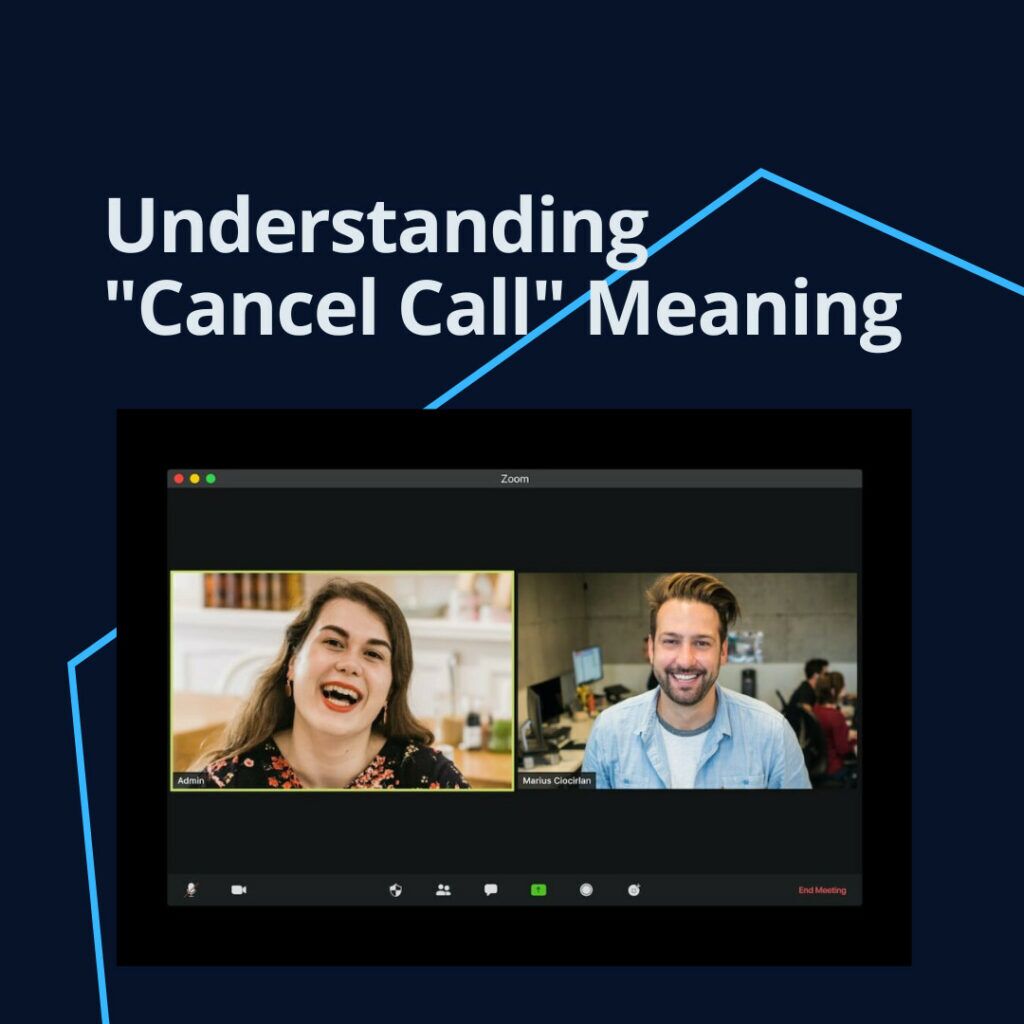In today’s digital age, communication has evolved rapidly. From the days of landlines to the modern era of smartphones, we now have numerous ways to connect. One of the primary modes of communication is through phone calls. However, in the realm of telecommunication, the term “cancel call” has become increasingly significant. What does it mean, and how does it affect our daily lives? So, let’s explore the cancel call meaning.

Cancel Call Meaning
A “cancel call” refers to the action of terminating or ending an ongoing phone call before it reaches its natural conclusion. This action can be initiated by either the caller or the recipient of the ring. In essence, it puts an abrupt end to the conversation, and the call is disconnected immediately.
How to Cancel a Call?
On a Smartphone
- Using the Screen: On most smartphones, you can cancel a call by simply tapping the red “end call” button on the screen. This action immediately disconnects the call.
- Physical Buttons: Some smartphones have physical buttons specifically designed for ending calls. Pressing this button while on a call will terminate it.
- Voice Command: Many modern smartphones also allow you to use voice commands such as “end call” or “cancel call” to disconnect the call.
On a Landline Phone
- Hang Up: On a traditional landline phone, you can cancel a call by simply hanging up the handset. This action effectively ends the call.
- Press the “End” Button: Some landline phones have an “end” button that you can press to cancel an ongoing call.
VoIP Services
- Software Interface: Voice over Internet Protocol (VoIP) services like Skype or Zoom often have a “hang up” or “end call” button within their software interface. Clicking on this button will cancel the call.
- Keyboard Shortcut: VoIP applications also commonly have keyboard shortcuts (e.g., Ctrl + Shift + H) that can be used to cancel a call.
Reasons to Cancel a Call
1. Mistaken Dialing: Sometimes, we make accidental calls by dialing the wrong number. Canceling the call prevents unnecessary communication.
2. Privacy Concerns: If you receive a call from an unknown or suspicious number, you may choose to cancel it to protect your privacy.
3. Emergency Situations: In certain emergencies, you may need to cancel an ongoing call to attend to a more urgent matter.
4. Call Drop: Poor network connectivity can lead to call drops, prompting you to cancel the call and retry.
5. Change of Plans: If your plans change suddenly, you might need to cancel a call to reschedule or attend to a different commitment.
6. Changed Mind: The caller might change their mind and decide not to proceed with the call for any number of reasons, such as deciding it’s not the right time to talk or they no longer wish to communicate with the intended recipient.
7. Privacy Concerns: In some cases, canceling a call can be a response to concerns about privacy or security. If the caller feels uncomfortable or unsafe, they may cancel the call to protect their personal information.
8. Technical Issues: Technical problems, such as poor signal reception or call quality issues, can lead to the cancellation of a call to ensure a more satisfactory communication experience.
The Etiquette of Canceling Calls
Canceling a call is a common occurrence, but it’s important to do so respectfully and considerately. Here are some etiquette guidelines to follow:
1. Inform the Other Party: If you need to cancel a call, try to inform the other party as soon as possible. A simple message or text explaining the situation is courteous.
2. Apologize if Necessary: If you’re canceling a call at the last minute and inconveniencing the other person, a polite apology can go a long way in maintaining a positive relationship.
3. Reschedule Promptly: If you’re canceling due to a scheduling conflict, make an effort to reschedule the call for a more suitable time.
4. Use Discretion: Avoid canceling calls frequently or without good reason, as this can be perceived as disrespectful or inconsiderate.
Impact of Canceling Calls in Different Contexts
The act of canceling a call can have various implications depending on the context in which it occurs. Let’s explore some common scenarios:
1. Personal Relationships
Canceling a call with a friend or family member may not have significant consequences, especially if it’s a one-time occurrence. However, repeatedly canceling calls without valid reasons can strain relationships and lead to misunderstandings.
2. Professional Settings
In a professional context, such as business calls or job interviews conducted over the phone, canceling a call without proper notice can be detrimental to your professional reputation. It may signal a lack of reliability or commitment.
3. Customer Service
When dealing with customer service or support calls, canceling a call can disrupt the service provider’s workflow and hinder problem resolution. It’s advisable to cancel such calls only if necessary and to provide clear information about the issue.
4. Telehealth and Appointments
In telehealth or medical appointments conducted over the phone, canceling a call can affect your health or well-being. It’s essential to communicate any cancellations promptly and reschedule if needed.
Technological Aspects of Canceling Calls
The process of canceling a call involves several technological aspects, particularly in the realm of mobile and VoIP communication. Understanding these can shed light on the complexity of modern telecommunications.
1. Network Handover
When you cancel a call on a mobile phone, the call is typically handed over to a lower-priority state or terminated altogether. Network handover ensures that network resources are used efficiently.
2. Call Disconnection Protocols
VoIP services use various call disconnection protocols to ensure that both parties are notified when a call is canceled. This includes sending signals to close the call gracefully.
3. Call Logging and Records
Telecommunication providers often log call data, including canceled calls, for billing and record-keeping purposes. These logs may also be used for quality control and dispute resolution.
The Evolution of Canceling Calls
The concept of canceling calls has evolved significantly over the years, alongside advancements in technology. Let’s take a journey through the history of canceling calls:
1. Landline Era
In the days of landline telephones, canceling a call was as simple as hanging up the receiver. However, it was relatively common for calls to be accidentally disconnected due to physical mishaps, such as the handset slipping from the cradle.
2. Mobile Phones
The introduction of mobile phones brought more sophisticated methods of canceling calls. With the advent of touchscreens and digital interfaces, ending a call became as easy as tapping a button on the screen. Mobile phones also introduced features like call waiting, call holding, and call forwarding, adding complexity to call management.
3. VoIP and Smartphones
The convergence of VoIP technology and smartphones revolutionized the way we cancel calls. VoIP applications offered additional features like video calls and screen sharing, further enhancing communication possibilities. Canceling calls in these apps often involves tapping on-screen icons or using voice commands.
4. Machine Learning and Call Prediction
In recent years, machine learning algorithms have been employed to predict and prevent unwanted calls. Some smartphone apps use AI to identify potential spam or fraudulent calls, allowing users to cancel or block such calls automatically.
Cancel Call Meaning: Conclusion
In conclusion, the term “cancel call” may seem straightforward on the surface, but it encompasses a range of actions and implications within modern communication. Whether it’s terminating a phone call, rescheduling an appointment, or navigating the complexities of social interactions, understanding the meaning and significance of “cancel call” is essential in our interconnected world.
It reflects not only the technical aspects of communication but also the social dynamics and etiquette that shape our interactions in today’s digital age. So, the next time you encounter the option to “cancel call” on your phone screen, remember the various meanings and implications associated with this seemingly simple action.
EXPLORE MORE: The Appointment Setter Jobs: What You Need to Know?
